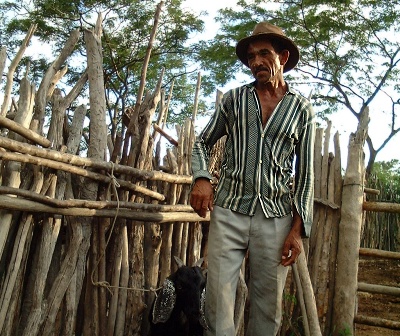
The guy in the photo is called Ze Preto (or rather that’s his nickname, it means Joe Black, which is something along the lines of Joe Blogs), and he lives on a subsistence farmstead a very bumpy half hour drive outside the inland market town of Ouricuri in Pernambuco, in North East Brazil.
I met Ze and his family in 2000, whilst I was working for the development charity Oxfam. They were one of the success stories of a project I was visiting, which was helping landless farmers to live a more secure life in the inhospitable climate of the Serṭo Рthe semi-arid region, where long annual droughts can kill off most crops. The project, called Caatinga after the hardy scrub plants of the region, was helping people to implement sustainable technologies like huge underground water butts, which filled in the rainy season and stored vital irrigation and drinking water the rest of the year.
The butts cost around £250 each, which was a huge sum for the people who needed them. The project provided loans for materials (cement mainly), and free technical assistance to build the structures, though most of the actual work was done by the farmers themselves, working together in small communities to build all the butts for those in a village who wanted into the project.
Once the water storage was in place though, everything followed on from there. Water grew crops for food and fodder. Livestock grew and multiplied, and people could diversify beyond just the basics, producing more of the products they needed to get by, and also establishing new things they could sell at market (such as honey, fruit or soap). It was still a life harder than I would ever want to live, but it was a world away from the vulnerability and hopelessness of those communities without this solid basic foundation.
Over a glass of the water of which they were so proud (purified with a branch of the neem tree, brought by the project from Africa as a natural disinfectant), Ze’s family generously shared honey and acerola fruit with us, and his son Cesar displayed a knowledge of English football leagues far better than mine. He was only just recovering from an infection, which he had had to sweat out in great pain, as they had no way to drive to the doctor in Ouricuri, and in any case no way to afford the drugs he would prescribe.
The next day, I woke pretty uncomfortably and over the course of the day got sicker – I had something similar to Cesar. I didn’t think anything of going to Ouricuri’s 24 hour doctor, who gave me a painkiller injection and precribed some hard to find antibiotics and painkillers (my Brazillian colleague told me doctors often favour particular brand names they’ve been bribed to pimp out). The cost came to about a month’s earnings for the local farmers, and that was just the start. Little better next day, I took a coach back to Recife and limped to a gleaming private hospital for ultrasound scans and a Harley St style specialist in the suburbs to top up my drugs.
My travel insurance paid for it, but at a cost equivalent to equipping several homes in Ouricuri with water butts, all just so I wouldn’t have had to go through the same painful experience as Cesar. I gained a valuable first hand lesson in the terrible unfairness of life – albeit from the more comfortable side.
I was hugely impressed by the people I was privileged to meet in the Sertão – farmers who had taken themselves from landlessness and extreme poverty through to becoming local entrepreneurs, and who had taken it upon themselves to learn what the World Bank and WTO were, and the international mechanisms and national injustices that kept their region poor. Where many villages had given up hope in the face of huge odds, those that had chosen to come together, with Caatinga’s help, to pool the work and build each others’ water butts, with the solidarity to help those who were finding the going harder, and then to plan new enterprises together, had come out the other side empowered and visibly stronger together as a community.
 This is my post for Blog Action Day, 15 October 2008, when over 9,000 bloggers are coming together to contribute thoughts on the issue of poverty, raise awareness and spark debate and change. Go join them at www.blogactionday.org
This is my post for Blog Action Day, 15 October 2008, when over 9,000 bloggers are coming together to contribute thoughts on the issue of poverty, raise awareness and spark debate and change. Go join them at www.blogactionday.org
A good cause
I did some fund raising for Oxfam and this was a campaign i could realky get behind
hy, Give something to help those hungry people in Africa and India,
I added this blog about that subject:
on http://tinyurl.com/6p6lb8